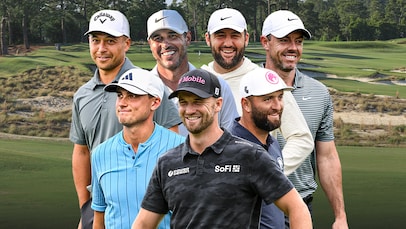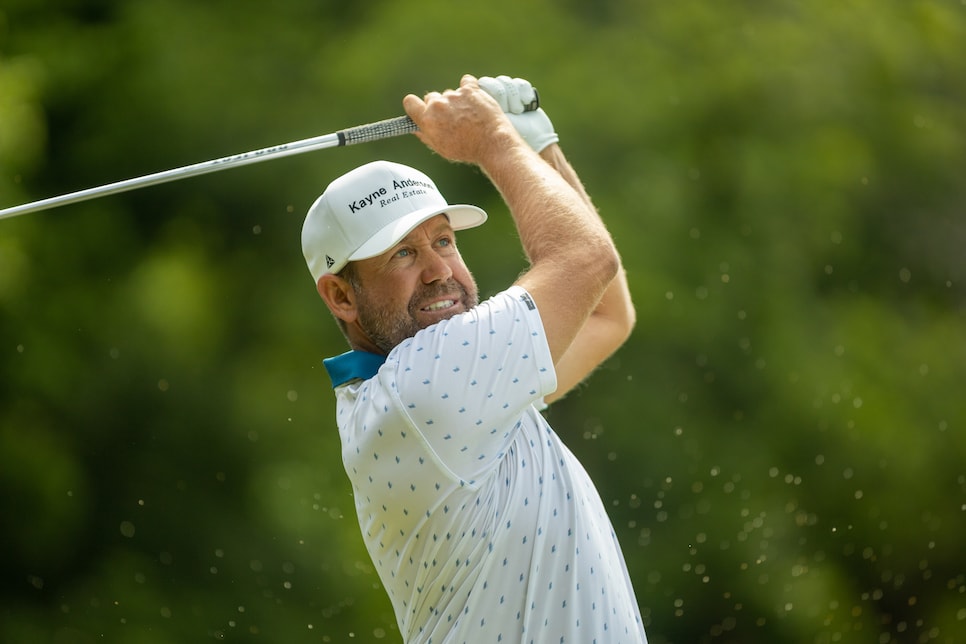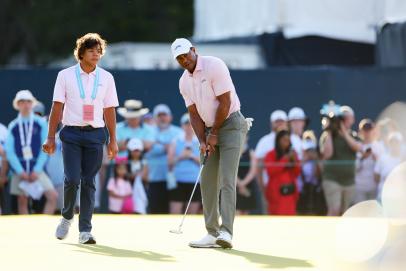PINEHURST, N.C. — Ten years ago Erik Compton was all the buzz at the U.S. Open, a guy who should have been dead playing and contending in his national championship. When his final putt at Pinehurst dropped his arm and the arms of thousands went up; he had finished in a tie for second, but in the eyes of the thousands watching Compton and his story were second to none, the moment seemingly coated in a sheen that could never be tarnished.
Ten years later, the U.S. Open is back at Pinehurst, but Compton is not. Technically his absence is due to a clerical error, but Compton knows paperwork isn’t the only thing barring him from the property. The former sentimental favorite is now persona non grata following felony domestic abuse charges for, among other things, allegedly tossing his wife into a wall. His forever moment is now a moment golf wants to bury in the past.
“The week was everything, it solidified who I was,” says Compton during a phone interview with Golf Digest on Monday. “Now, the past eight months have clouded everything else.
“Had my career ended and I never played golf again, it might have been a better story.”
There is a romanticism to the U.S. Open that other American majors lack. The Masters is an invitational and the PGA Championship limited to professionals, but at the U.S. Open, it doesn’t matter who you are or what you’ve done. Its invitations are not given; they are earned. Compton, a then 34-year-old journeyman, encapsulated this fantasy. He was someone who toiled for years on golf’s mini-tours, gaining and losing his tour card in his 30s, who kept on going despite a body that did everything it could to make him surrender.
More Golf Digest U.S. Open Coverage U.S. Open U.S. Open 2024: Why Charlie Woods is Tiger’s new swing coach  Ranking The Field U.S. Open 2024: Power rankings for the entire field at Pinehurst
Ranking The Field U.S. Open 2024: Power rankings for the entire field at Pinehurst  ‘The Hole At’ The scariest green at Pinehurst #2, explained
‘The Hole At’ The scariest green at Pinehurst #2, explained
As a kid Compton was diagnosed with viral cardiomyopathy, a condition where the heart muscle is inflamed and unable to pump as it should. He underwent a heart transplant at 12, then another at 28. The latter came after a heart attack. Compton ended up driving himself to the hospital during that cardiac event and made phone calls during the drive: The first to the hospital to let doctors know he was coming, the ones that followed to his friends to tell them goodbye.
So when Compton earned a spot at the 2014 U.S. Open through sectional qualifying, made the cut and shot a third-round 67 to vault into contention at Pinehurst, golf had found its Cinderella.

Compton seemed to come out of nowhere to get into contention at the 2014 U.S. Open at Pinehurst, finishing tied for second.
Mike Ehrmann
Compton didn’t threaten eventual champ Martin Kaymer, not truly, Kaymer’s five-shot advantage only dropping to four during Sunday’s final round en route to an eight-stroke victory over Compton and Rickie Fowler. Yet the crowds in North Carolina and at home fell in love with Compton, and how could they not? In front of them was a competitor laboring like hell just to make it to the next day. The galleries at Pinehurst let him know, doing everything they could to carry him home.
“I was playing with Henrik Stenson [that day]. He told me the cheers I got, especially coming up 18, gave him goosebumps,” Compton said. “Bigger than what he experienced at the Ryder Cup. So many people were pulling for me. When I walked off that [final] green, I gave my caddie and best friend Victor Billskoog a hug and told him, ‘It doesn’t get better than this.’”
The runner-up finish provided career stability, both inside the ropes and out. Golf zealots knew his background before Pinehurst but the platform the U.S. Open provides made him a celebrity. He was asked to talk at corporate outings and schools and community groups. Sponsors wanted to associate themselves with an advocate and warrior. At every tour stop Compton would visit hospitals, talking with those facing similar health battles, his presence a living embodiment of hope.
“It was a lot of responsibility,” Compton says. “I spoke to every transplant in every state, talked to doctors who viewed me as something of a modern miracle. This on top of playing on the PGA Tour. I was busy, and it put a lot of stress on my play and my family.”
Heartwarming as Compton’s story he never came close to replicating his Pinehurst feats. Within two years he lost his tour card. In the ensuing years he returned to golf’s mini-tours. There was the occasional story of how golf’s underdog was still chasing what he had that U.S. Open week, but for the most part, he faded into the game’s wilderness. Now in his 40s he played against players half his age, most of whom don’t know who he is or what he experienced or what he did for four days at Pinehurst.
Then in August 2023, Compton was back in the news, arrested on felony and misdemeanor domestic violence charges.
According to officials from the Miami-Dade police department, Compton and his wife were having a verbal argument on Aug. 19 at their house in Miami when his wife took out a cellphone and began recording. Compton allegedly took the phone and threw it in a pool, then grabbed his wife by the shoulder and tossed her into a wall. Compton’s wife left the residence and went to a friend’s place, where she called authorities. The golfer invoked his right to an attorney and declined to speak with officials about the alleged incident, according to the police. He was arrested on a strong-armed robbery charge, which is a felony, and a misdemeanor battery charge. Compton was taken to Turner Guilford Knight Correctional Center in Miami and later bonded out.
The case remains open, according to Miami-Dade records, with the latest fillings signaling deferred prosecution, an agreement between the prosecutor and defendant where the charges will be dropped after the defendant meets certain requirements.
Compton says he cannot speak to specifics of the incident in question, only acknowledging what happened “is not reflective of who I am.”
“I can’t talk about it, all I can say is, stuff happens,” Compton says.
In the ensuing response, Compton says this “nothing happened” but also that “stuff happened” without adding any detail, only that he and his wife are still together. “I don’t know how to describe it,” he continues of the incident. “And it’s just unfortunate that, that things like that happen and you don’t know why.”
He’s not been excommunicated from golf. Compton has played a full schedule on the Korn Ferry Tour this year, and made a spot start on the PGA Tour in the Dominican Republic earlier in the season. Still, Compton is not obtuse to the fact he has become something of an undesirable entity, a sentiment underlined by this week.
Compton was hoping to play in the 2024 U.S. Open, but Compton says his agent forgot to fill out his entry form. He was hoping to get an exemption from local qualifying due to his ties to his event and, according to Compton, something “got lost in translation.” By the time Compton discovered what happened, the USGA had closed tournament entries. But given what he did here a decade ago, one would expect Compton to be on the grounds in some capacity. To do a guest spot on the telecast, to talk at the myriad corporate outings and civil functions hosted this week. Golf loves to honor its past, to nod to the people that made the sport better off, and for the longest time Compton was the avatar for all the good things that golf prides itself to be.
Now? Now, the phone doesn’t ring as much, Compton says. There were no offers to come to Pinehurst, no celebrations for what Compton once was and who he says he still is.

Compton has played a full Korn Ferry Tour schedule in 2024 with an occasional start in a PGA Tour event.
Eston Parker/ISI Photos
“I’m a little hurt about it because, I don’t know if people want my input,” Compton says. “This is weird, I don’t know what comes next. I would have loved to have talked about some shots, some of those memories. But now I have a story that people don’t want told.”
Compton says “people can see what they want” about him. He claims his arrest received more attention than it deserved because he’s a heart transplant recipient, and that comparable situations have been less publicized. He also has become jaded towards the professional game, citing the civil war and schism between the tour and LIV Golf. “All of it is bull**** to me. It doesn’t mean anything to me anymore from a quality standpoint, all these guys making $20 million,” Compton says. “I still like to compete. I’m still as good of a player, but it’s become a closed shop.”
At 44, Compton says he’s on borrowed time. Most medical professionals are of the belief he shouldn’t be alive, so it’s hard to take them at their word when they try to prognosticate what’s ahead. “I know more about heart transplants than the doctors. How many heart transplant [patients] are 34 on two hearts? Are you going to tell me how I feel? I don’t pay attention to how I feel. I just keep going.”
The same mindset applies to his professional aspirations. Compton has missed the cut in nine of 12 Korn Ferry starts in 2024, including failing to reach the weekend in his last four outings. “I’m not sure what the end goal is,” Compton explains. “I’m trying to fund my living, trying to provide for my family. What I have, what I go through, getting older doesn’t make it easier. I’m not 28, I’m almost 45 with a gray beard. You look at professional golf, not a lot of guys like me anymore.”
He knows he’s no longer a feel-good tale, that things are “complicated,” to say the least. That most would be OK if he disappeared. But he has no appetite for the alternative. If Compton walks away from the game, the dream of “being an example for transplants” is done, he says. That’s why this week he’s 1,000 miles away in Wichita at the Korn Ferry Tour’s Kansas Open, a tournament where he has had success at, reaching a playoff twice. A good week there can get him back on tour, a good week on tour can get him back here. It’s still the only demon he’s chasing, because if he quits, Erik Compton knows his story is over, and there’s no chance to rewrite it.
MORE GOLF DIGEST U.S. OPEN COVERAGE
U.S. Open 101: Answering all your frequently asked questions
How to watch the 2024 U.S. Open
Power Rankings: Every player in the U.S. Open field, ranked
The 13 best bets to win at Pinehurst
Tee times for Rounds 1 and 2
‘A New Day’: USGA president Fred Perpall brings dynamic personality and drive to golf
Video: Every hole at Pinehurst No. 2
Is the USGA going to set up Pinehurst extra hard because of recent low scores in majors?
Tiger is playing Pinehurst on a special exemption. Here’s what it is and why he got it
What would you shoot at the U.S. Open? Our new tool will tell you
U.S. Open anchor sites are about far more than golf
The U.S. Open champion who died in a jail cell
The USGA is about to play its 1,000th championship. The best 9 stats from the first 999
This article was originally published on golfdigest.com
